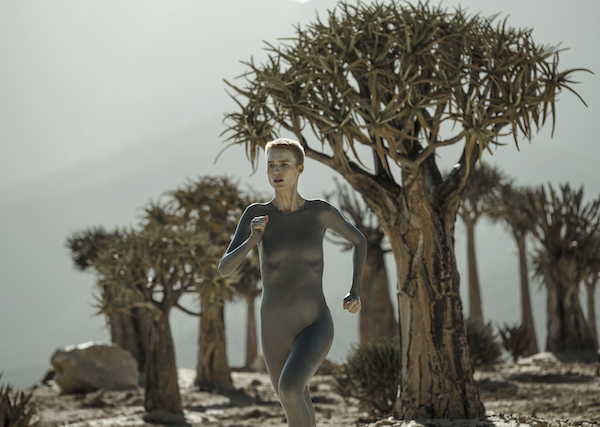It was the extraordinary and eerie sight of a “tablecloth of cloud” coming over the mountains near Lourensford in the Western Cape that had renowned director Ridley Scott (Alien, Blade Runner, The Martian, Prometheus and Gladiator) entranced.
He was in South Africa to shoot the biggest budget TV series ever filmed in the country, HBO’s Raised by Wolves.
Scott told Forbes magazine: “We found a range of mountains that were in your face for about a kilometre, and every morning this tablecloth of cloud would come in, it would just roll over them, and I went, ‘Oh my God!’ It was surreal, it was otherworldly, so half the work was done, just by the location.”

The epic and binge-worthy sci-fi series – touted as being the best sci-fi since Scott’s Alien) is now on Showmax. Shot in Cape Town with Film Afrika, the story follows two androids tasked with raising human children on a virgin planet, after Earth has been destroyed in a religious war.
Magnificent South African locations like Stellenbosch and Lourensford Wine Estate outside Somerset West form the haunting backdrop of planet Kepler 22-b, a real planet around 620 light-years from Earth that scientists speculate could potentially support life, though we don’t yet know what its surface actually looks like.
But what really makes the South African landscape feel alien to foreign audiences are the quiver trees (also known as kokerboom trees).
“What I loved in the (South African) desert were the trees, which were something in the aloe/cactus family,” Scott said. “I said, ‘I have to have those trees.’ We got permission to transplant some onto a piece of terrain less than a kilometre from the foot of this beautiful mountain range…”
The interiors of The Ark were constructed at Cape Town Film Studios, while Raised by Wolves also shot at locations like The Good Hope Centre and the old Maitland abattoir.
Scott’s long-time collaborator Dariusz Wolski, who was also director of photography on The Pirates of the Caribbean franchise, was nominated for a 2020 Camerimage Award for the series pilot, so you know our landscapes are in safe hands.

Raised by Wolves has already been nominated for three 2021 Critics Choice Super Awards: Best Science Fiction/Fantasy Series, Best Actor: Sci-Fi for Travis Fimmel (Vikings’ Ragnar) and Best Actress: Sci-Fi for Danish actress Amanda Collin, whose character, Mother, was hailed by The Wall Street Journal as “the most memorable female/female-like space entity since Sigourney Weaver’s Ripley in Alien.”
The cast includes Abubakar Salim (Jamestown, Fortitude), Niamh Algar (Pure, MotherFatherSon), and Matias Varela (Narcos, The Borgias, Assassin’s Creed), who co-star alongside a host of South Africans, including Clayton Evertson (Arendsvlei), Susan Danford (Still Breathing), Litha Bam (Intersexions), Garth Breytenbach (8, Troy: Fall of a City), Tristan de Beer (The Girl from St Agnes, Rage), Tanya van Graan (Die Spook van Uniondale, Zulu), Tarryn Wyngaard (DAM, The Watch, Dwaalster), Jenna Upton (Cape Town) and Anlia van Rensburg (Getroud Met Rugby), as well as Loulou Taylor and Daniel Lasker in breakthrough roles.
Film Afrika line producer Cheryl Eatock confirms Raised By Wolves is the biggest budget show ever to film in South Africa. For context, she says, Season 1 created nearly 700 full time equivalent jobs, 52% of which went to youth and 66% of which went to historically disadvantaged individuals. The series also hired 1 200 businesses, predominantly small, medium and micro enterprises. 25 historically disadvantaged individuals received hands-on training, facilitated by the non-profit The SA Film Academy (SAFA), an accredited training provider established and managed by the SA production service companies to ensure growth in the industry. And 18 SAFA alumni worked as full crew members of Raised By Wolves.
Eatock confirms Collin is already back in the country prepping for Season 2: great news for the South African economy, our international service sector that has been brutalised by the pandemic, and all sci-fi fans.
As NME says, “Ridley Scott’s AI stunner is on a different planet… one of 2020’s most unmissable TV experiences.”














